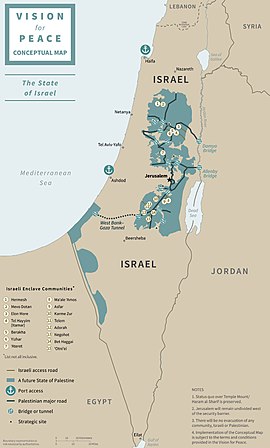Biden Administration needs creativity to solve the Israeli-Palestinian conflict
- Luis Fleischman
-
 Topic Author
Topic Author
- Offline
- Junior Member
-

- Posts: 39
- Thanks: 5
Biden Administration needs creativity to solve the Israeli-Palestinian conflict
21 Apr 2021 22:41 - 26 Apr 2021 23:10
[ Publicado originalmente en el Palm Beach Post ]
The Biden Administration will attempt to give new life to the Israeli-Palestinian negotiations.The Administration has expressed its desire to solve the Israeli-Palestinian conflict and has reaffirmed the notion that a two-state solution continues to be the best option to fulfill both the aspirations of Zionism (a Jewish and democratic state) and Palestinians (self-determination in their own state).
Of course, the two-state solution is ideal. But it's not necessarily realistic. Over the years, the Palestinian leadership rejected compromise formulas that included the withdrawal of 100% of Gaza and more than 90% of the West Bank; the creation of an independent Palestinian state; and the division of Jerusalem between Israel and a Palestinian state and recognition of the two parts of the city as the capital of the respective states.
There was no other formula to reach an agreement, yet the Palestinians rejected these compromises offered by various Israeli governments and American Administrations. Instead, as two Palestinians involved in the negotiations, Hussein Agha and Ahmad Khalidi acknowledged recently in a piece published by Foreign Affairs, the Palestinian leadership lacked "a clear position that is attainable and desirable."
Indeed, the Palestinian leadership unrealistically demanded all of Jerusalem and the right to return 3 million Palestinians to Israel proper. The Palestinian leadership rejected the role of the United States as mediator even under the sympathetic Obama Administration. Instead, it turned to the international community to make unilateral declarations in support of a Palestinian state or to adopt resolutions aimed at delegitimizing Israel in the United Nations.
The fact is, surprising as it may sound, the Palestinian leadership didn't really want to create a Palestinian state. The reason is simple. If a Palestinian state were established, the Fatah leadership would have been under the threat of collapsing because of Hamas, whose military might have overthrown the Palestinian Authority as it did in Gaza in 2007. And Fatah also faces a crisis of internal legitimacy in the West Bank due to its corruption, mismanagement, and oppressive character.
The status quo has suited the Fatah leadership because it kept it in power. Without a Palestinian state, security cooperation with Israel protected the Palestinian Authority from being overthrown by Hamas. And the Palestinian Authority continued receiving financial support from the international community.
The Fatah government also needed to appease its Palestinian detractors. Thus, it increased its incitement against Israel despite an official policy of non-violence. It spread anti-Israel propaganda in the school system and the media, honored terrorists and provided money to terrorists' families.
The inevitable result is that the Palestinian people find themselves in a state of permanent revolution and conflict. Their everyday lives are negatively affected by constant mobilization. This generation and younger generations of Palestinians are likely to maintain and develop a deep hatred of Israel, making it impossible to achieve reconciliation.
It is no surprise that Palestinians have been recruited not just by Hamas but also by other extreme terrorist groups of global reach. Radical Islamist groups have actively recruited individuals in Palestinian refugee camps. Examples are the late Abdallah Azzam, who was the spiritual mentor of Osama Bin Laden; Abu Qatada Al Fillstine, the spiritual leader of Al Qaeda in Europe; and Abu Muhammad al Maqdisi, mentor of the late Abu Musa Al Zarqawi, the former leader of Al Qaeda in Mesopotamia.
In April 2017, King Abdullah of Jordan pointed out that Palestinians have perpetrated 96% of ISIS attacks in the kingdom.
And so, a viable solution to the Palestinian issue must aim to secure a stable and legitimate Palestinian entity on the one hand and guarantee the normalization of Palestinian lives on the other hand.
An independent Palestinian state will not be capable of achieving those goals. It is likely to be anarchical or fall into the hands of Hamas or, even worse, various Islamist groups.
Thus, the solution needs to be found within the Arab world. Palestinians historically saw themselves as part of the larger Arab world, and many still do. They can keep their autonomy by forming a West Bank confederation with Jordan and perhaps a union of Gaza with Egypt. Palestinians need to be settled in a more orderly entity, and these two Arab countries could provide it.
Likewise, Palestinians residing in Arab countries should be provided full citizenship with full rights in those places to avoid a situation like the tragic 1991 expulsion of 200,000 Palestinians from Kuwait (as collective punishment because the Palestine Liberation Organization, or PLO, supported Iraq's Kuwait invasion).
Refugee camps should be dismantled to help Palestinians build an everyday life free of conflict. A union with Israel in the form of an Israeli-Palestinian confederacy or a one-state solution shouldn't be an option; that would lead to an Israeli-Palestinian civil war.
The Biden administration must be thoughtful and creative. It should continue to support normalization between Israel and the Arab world, but it should make sure that Arab states are part of the solution of the Palestinian problem.
[For a much deeper analysis and a better background of this delicate conflict, read "The Middle East Riddle: A Study of the Middle East Peace Process and Israeli/Arab Relations in Changing Times". The interested reader may find a book review on this title HERE: democraciaparticipativa.net/do...dle-east-riddle.html ]
Last edit: 26 Apr 2021 23:10 by Gerardo E. Martínez-Solanas.
The following user(s) said Thank You: Chilton Williamson Jr.
Reply to Luis Fleischman
Moderators: Miguel Saludes, Abelardo Pérez García, Oílda del Castillo, Ricardo Puerta, Antonio Llaca, Efraín Infante, Pedro S. Campos, Héctor Caraballo
Time to create page: 0.613 seconds
